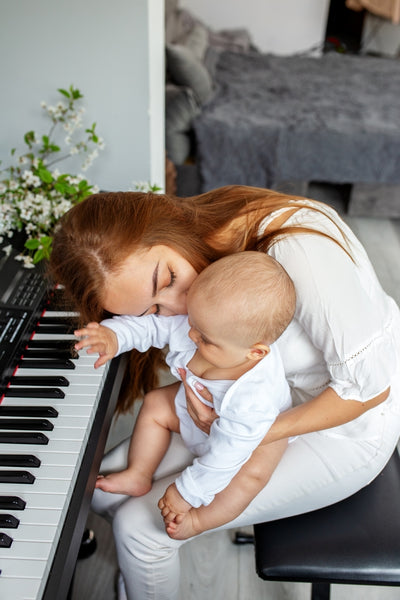No matter where you are in the world, babies seem to be inherently drawn to music. From stretching out their vocals to getting their bodies moving, they just love it. And music loves them, too – it can have a key role to play in their development. Let’s look at some of the benefits music can have for our little ones!
What makes music important?
Many of the same effects music has on us as adults also apply to babies and children. It can calm, entertain, and, yep, it can stimulate their brain development, too! Music has the ability to activate different areas of our brains, which helps to enhance cognitive, emotional and social development. It has even been shown to have these effects in the brains of newborns, particularly the auditory and prefrontal cortexes – these areas are the ones that help process speech1. How amazing is that?
There’s more than just that, though – music is a great way to bond with your little one! Music offers a wide range of benefits for babies, and that’s beyond just developing an enjoyment for the art.
Soothing and calming
One of the very first things you might think of when it comes to babies and music is lullabies, and there’s a good reason for that. Lullabies have been used probably almost as long as humans have been capable of singing to their little ones. The oldest recorded lullaby was written down 4000 years ago in Babylonia2 – meaning the songs themselves have likely been around much longer. Even the word itself hints at these songs’ purpose – the word lullaby comes from the Middle English word lullen (to lull, soothe or calm). Lullabies often are gentle and rhythmic, almost using song to imitate the motion of rocking – and in fact, many parents rock as they sing to their children. This helps to regulate their heart rate and breathing, letting them lull them to sleep.

Brain development
As mentioned above, music is fantastic for helping brain development. Because it stimulates their language centres, it gives them a better base to work off as they’re learning speech. In fact, recent studies have shown that children who learn musical instruments develop stronger attention and working memory skills than children who don’t3. So not only is music and playing an instrument fun, but it can also give your little one an enjoyable way to learn skills that will help them out in all areas of life.
Physical coordination
If there’s one thing that almost always goes with music, it’s dance. Play some music, sing a song, and it’s very common to see babies—and the rest of us, to be honest—dancing and moving in time. This is more than just fun for little ones – it helps with many aspects of their development. As well as learning creativity and expression, it also helps their physical development by working on strengthening their muscles and coordination. Dancing along to music, even if it’s just by bobbing their head or waving their hands because they still can’t walk, has enormous benefits.
Language development
Music plays a fairly significant role in the development of language skills. The rhythms, melodies, and repetition in songs all contribute to learning how to speak. It’s particularly the rhythm in music that helps us to learn the mechanics of speaking4,5. At the same time, the lyrics themselves introduce a whole new set of vocabulary and grammar that might not be part of day-to-day conversations. Whether it’s your favourite song or a hundred-year-old lullaby, they all play this role, so it really doesn’t matter what you’re singing or listening to – it all helps build those speech and language skills!

Bonding
Music, pretty much from the beginnings of humanity, has served a bonding purpose. It brings people together, and that includes parents and babies. From the time they’re very little, singing, dancing, and playing instruments helps to create bonds. Music has long been linked with human emotional regulation, and studies show that may even extend to newborns6. But even aside from that, singing and dancing with our little ones is fun. It is a great way to build up memories and have times in the day when parents and children can just enjoy being together without the worries of day-to-day life weighing things down.
As you can see, music is more than just an amusement or a way to distract little ones – it has real benefits for the development of babies and children. That includes emotional and physical development, as well as the building of bonds with those around them. Sing them a lullaby, dance to a song on the radio, or chuck on your favourite playlist; it all goes towards helping your little one in an enjoyable, stress-free way.
Sources:
1Baby music: The soundtrack to your child’s development. (n.d.). UNICEF Parenting. https://www.unicef.org/parenting/child-development/baby-music-soundtrack-to-development
2Perry, B. N. (2013, January 21). The universal language of lullabies. BBC News. https://www.bbc.com/news/magazine-21035103
3Kausel, L., Zamorano, F., Billeke, P., Sutherland, M. E., Larraín-Valenzuela, J., Stecher, X., Schlaug, G., & Aboitiz, F. (2020). Neural dynamics of improved bimodal attention and working memory in musically trained children. Frontiers in Neuroscience, 14. https://doi.org/10.3389/fnins.2020.554731
4The Power of Music Play: Enhancing Language Development in Early Childhood. (2023, June 2). Play Matters. https://playmatters.org.au/blog/the-power-of-music-play-enhancing-language-development-in-early-childhood
5Pino, M. C., Giancola, M., & D'Amico, S. (2023). The Association between Music and Language in Children: A State-of-the-Art Review. Children (Basel, Switzerland), 10(5), 801. https://doi.org/10.3390/children10050801
6Nagy, E., Cosgrove, R., Robertson, N., Einhoff, T., & Orvos, H. (2022). Neonatal musicality: Do newborns detect emotions in music? Psychological Studies, 67(4), 501–513. https://doi.org/10.1007/s12646-022-00688-1

